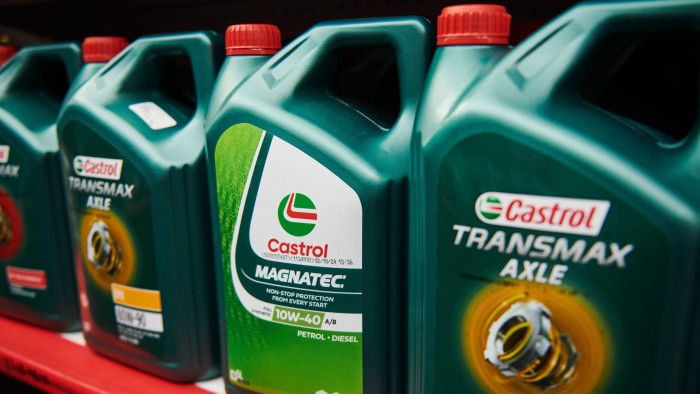Unlock the Editor’s Digest for free
Roula Khalaf, Editor of the FT, selects her favourite stories in this weekly newsletter.
BP’s sale of its lubricants arm Castrol has drawn early interest from private equity and industry bidders, including China’s state-owned investment company Citic, although some are considering offers below the expected $8bn-plus range.
Failing to achieve a higher price would be a blow to BP, which put Castrol up for sale in February. The disposal is the key part of a package to raise at least $20bn from asset sales by 2027 as it tries to revive its share price and fend off pressure from activist hedge fund Elliott.
Analysts believe BP needs to sell Castrol at an enterprise value of $12bn if the deal is to improve the company’s free cash flow, but have questioned whether the company can obtain such a price given the rise of electric vehicles, which require less lubrication.
However, some bidders are exploring valuations less than $8bn for Castrol, people with knowledge of the matter told the Financial Times.
The sale process is being run by Goldman Sachs and has seen interest from US private equity firms Apollo and Lonestar, industry players such as Saudi Aramco and the Indian conglomerate Reliance, and now Citic, according to people involved in the sales process.
The UK entrepreneur Zuber Issa, the co-founder of petrol station company EG Group who recently paid £50mn for motor oil brand Duckhams, is also interested, according to two people familiar with the matter. The Sunday Times first reported Issa’s involvement.
“We have got, as you might imagine, great interest in that asset,” said Murray Auchincloss, BP’s chief executive, to analysts in May. “It is an iconic brand that has been in place for 125 years [ . . .] that is looking strong.”
While some bidders were eyeing offers of less than $8bn, the process was at an early stage and people involved said higher bids could emerge, particularly from industry buyers with the option to combine Castrol with their own operations.
Castrol made an underlying profit of £284mn before tax and interest in the first quarter of this year, up 29 per cent from the same period in 2024. BP bought the engine lubricant business from its family owners in 2000 for £3bn.
BP has said it will use the proceeds from a Castrol deal to reduce its net debt, which it is trying to cut from $27bn to between $14bn and $17bn by the end of 2027.
BP plans to raise the rest of the $20bn asset sale target by offloading its older oil and gasfields, selling equity in its solar business Lightsource, and doing infrastructure deals. Recently, it sold a share of a gas pipeline in Turkey to Apollo for $1bn and said it would sell its Austrian petrol station network.
The company is under pressure from Elliott, which has built a 5 per cent stake in BP, to sell off non-core assets and severely cut its costs. In February, it announced a “fundamental reset” of its operations to focus on oil and gas and jettison a strategy centred on green energy. Since then, its share price has fallen 16 per cent, compared with a 7.5 per cent fall for rival Shell.
Last week, BP announced that David Hager, the former head of US shale company Devon Energy, would join its board of directors in order to bolster the company’s oil and gas expertise.
BP, Apollo, Lonestar, Aramco and Issa declined to comment. Citic and Reliance Industries were not immediately available for comment.

